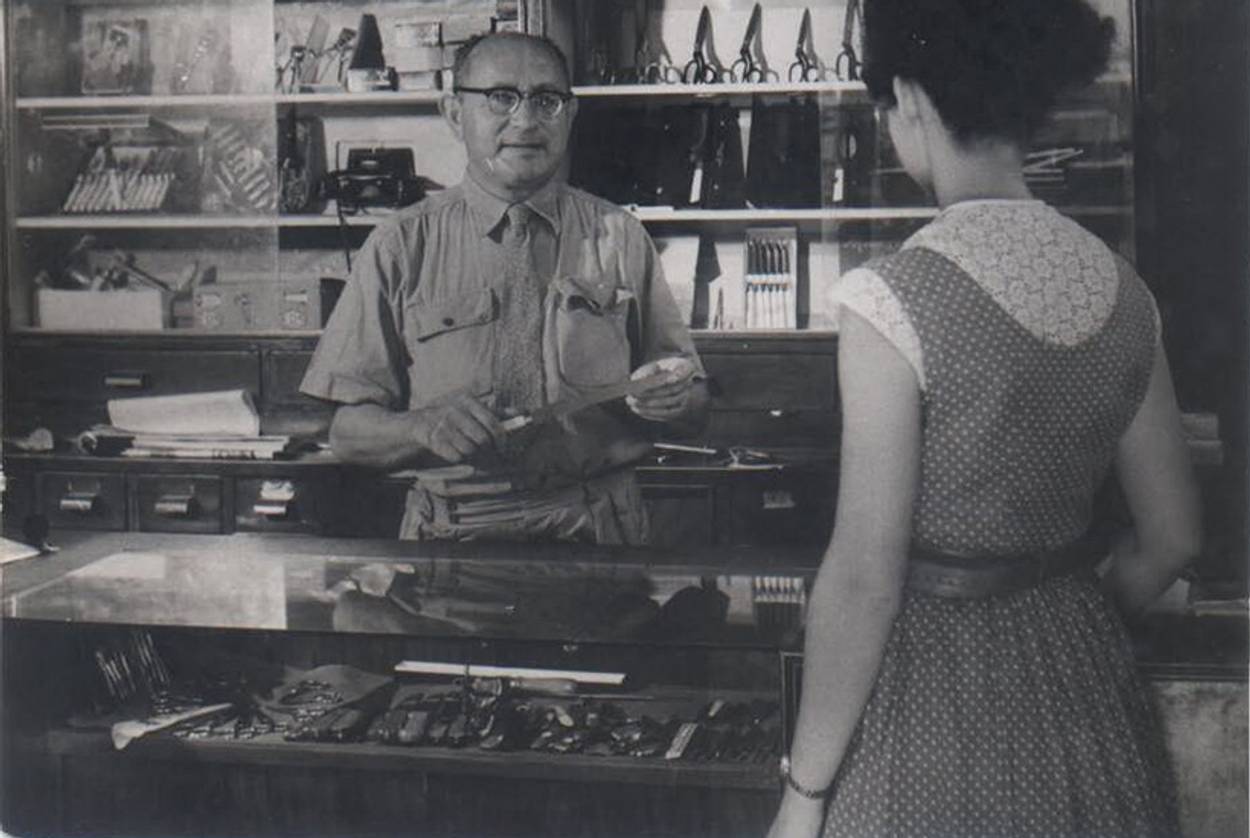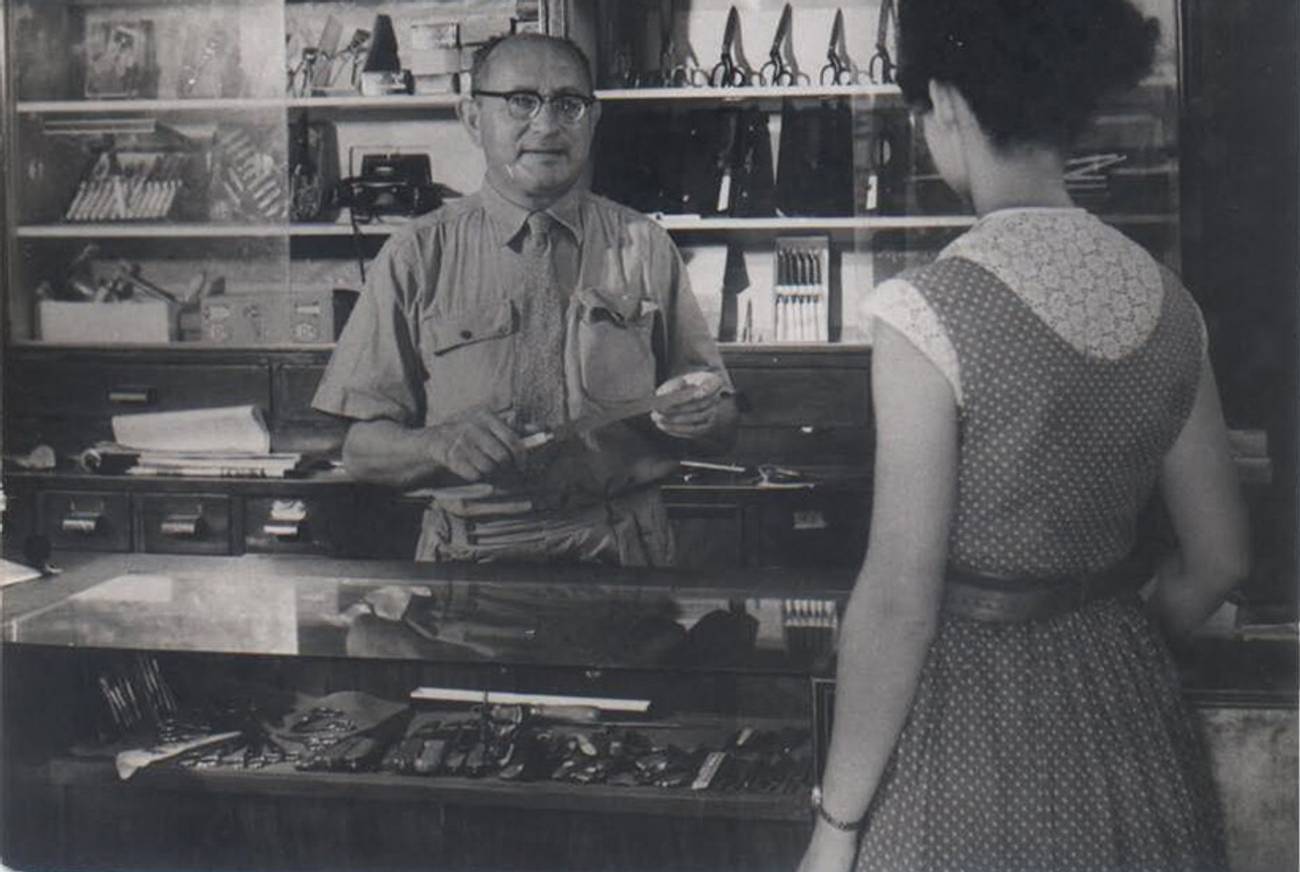A New Chapter for the Family Whose Name Has Stood for Knives in Israel for Generations
After more than 75 years in business, the Lublinsky family opens a new flagship store to replace its iconic Tel Aviv knife shop




“The knife is the most important tool in the kitchen, and as a chef your knife is your instrument,” leading Israeli chef Leon Alkalai told me. “Just like a violinist in the philharmonic orchestra brings his own violin, a cook should bring his own knife.”
Where does Alkalai go to buy his knives? Lublinsky. Anyone who ever lived in Tel Aviv remembers the store on King George Street with the orange “Dov Lublinsky & Son” sign. Even people who never entered the place knew that the knives and scissors in the window seemed to be part of Tel Aviv’s permanent landscape. “What’s special about Lublinsky,” explained Alkalai, who’s been a customer for at least 20 years, “is that they’re the finest professionals and have a true passion for what they do.”
In Israel the name Lublinsky is synonymous with knives; the family opened its first store in 1938, before the state of Israel was born, and four generations of Lublinsky men have dedicated their lives to the business. This year, however, has brought major change: The main location on King George Street closed in March after 56 years, and a new flagship store opened on Karlebach Street, next to the Tel Aviv Cinemateque. Bigger and fancier than the old store, the new location is being billed as a “concept store” that focuses almost exclusively on knives and cutting equipment, without the other kitchen accessories and home products that the King George shop also sold.
“It was a good time to move to a new location,” said CEO Shraga Lublinsky, noting problems with the old landlord and a decline in commercial activity on King George Street. And now that the shop on Karlebach is up and running, he’s talking about opening stores in other cities in Israel as well.
***
The family first got into the knife business in Lublin, Poland, before World War II, when 14-year-old Menachem Lublinsky’s parents urged him to learn a trade. He became an apprentice to a local knife sharpener, and when he made aliyah in 1925 with his family, including his one-month old son, Dov, he found work with a local knife sharpener there. When he decided to strike out on his own, Menachem attached a cart with a whetstone to his bike and rode around Tel Aviv, offering his sharpening services. He opened a small sharpening business on Sheinkin Street in 1938 and started making knives and scissors out of iron and coils. His sons Dov and Shlomo (who was born in Israel) started working in their father’s store as teenagers. When Dov joined the Haganah—the Jewish paramilitary organization in the British Mandate of Palestine—at the age of 16, he secretly converted his father’s business into a repair workshop for guns. He then married an Orthodox woman named Malka, whose family ostracized her for marrying a non-Orthodox man, and fought in Israel’s War of Independence.
Dov was always ambitious, and he and his father didn’t see eye to eye. The young Lublinsky wanted to expand the business, while his more conservative father was resistant to change. After a family feud, Dov left the business and in 1958 opened his own shop on Tel Aviv’s busy King George Street. Menachem and Shlomo remained on Sheinkin until the 1970s, when they closed their shop. Menachem moved to a tiny room on Hess Street, where he sharpened knives until the end of his life in the late 1980s, while Shlomo opened a knife shop and sharpening business on Nachalat Binyamin Street, where he works to this day.
Dov’s shop on King George Street, where his wife also worked in the early days, was situated between an ice shop and small workshops that repaired umbrellas and bags. The shop included a workshop and a store, and soon Dov expanded into wholesale, marketing scissors to the textile industry and knives to institutions. The business did well, but 1973’s Yom Kippur War changed everything, at least for a while: Dov’s eldest son, Ehud, was a soldier and went missing in action. Dov and Malka dedicated all their time to finding their son; after five months, they found out that he was taken prisoner in Syria, and a few months later he was released. During that difficult year, friends and family members helped out to keep the business going. After the ordeal was over, Malka never returned to work in the shop, but Dov continued, and his second son, Shraga, who describes himself as “being born with a knife in his hand,” also joined the family business in 1976.
Shraga, who is now 62, held a passion for knives since an early age. “Since elementary school I worked with my dad in the shop on vacations,” he told me. “When I was 14 or 15 he gave me a bayonet as a present, and that really ignited the spark. I started collecting historical edged weapons and still do so to this day.”
Shraga took over the family business in the early ’80s and brought changes, just as his father did before him. Until then, the store sold only locally manufactured merchandise—whether it was their own or from other Israeli producers—but Shraga started importing. Lublinsky opened a small store in Nahariya 15 years ago and another branch in Tel Aviv, on Kibbutz Galuyot Street, 11 years ago. Around that time Shraga also launched Lublinsky’s own brand of knives, called Berox.
Lublinsky is still a family business: Dov Lublinsky still owns it today at the age of 89, together with his son Shraga and Shraga’s 28-year-old son Yuval, who joined the business two years ago and is now Lublinsky’s VP of sales. “Now that my youngest son, Yuval, joined the business, we have new blood and a new energy in the business,” Shraga said proudly.
Nowadays Lublinsky offers more than 4,000 different products, and not only kitchen knives: The store sells all kinds of pincers, slaughter knives, professional manicure and pedicure accessories, professional scissors (for hair dressing, tailoring, etc.), knife-sharpening equipment, and even circumcision knives, guards, and scissors for brit milah. The owners also hold workshops dedicated to the art of cutting and chopping, knife sharpening, and food décor. “I went to one of our chopping workshops myself,” Shraga said, “and now I am my wife’s sous-chef at home. Cooking has become a huge thing in Israel since all these cooking reality-TV shows started popping up. About 60 percent of our business is based on the culinary side, and we certainly feel an increase in business since food became such a big thing in the country.”
Professional chefs are also a big part of Lublinsky’s clientele. “It’s enough to talk to Shraga to sense his love for his profession,” Alkalai explained, noting that one of the things he appreciates most about Lublinsky is that the owners listen to the customer: “Shraga sharpens exactly to the customer’s needs, and he even makes custom-made products.” Alkalai is one of the co-owners of Tony Vespa—a hip pizza chain—and when he wanted a specific pizza-knife that wasn’t available in Israel, Shraga made one especially for him.
Celebrity chef Yisrael Aharoni has also been a client for over 30 years: “I sharpen my knives at home, and once a year I send them out to a professional, and it’s always Lublinsky,” he said. “They’re super-professional. They’ve been doing this for generations, and knives are part of their DNA.”
When you enter Lublinsky, like any other knife-store, you are overwhelmed by the variety, but Aharoni doesn’t think one needs so many different kinds: “I own many knives because I am an avid collector, but I don’t think you really need them. I think that for a well-equipped home-kitchen, three or four good knives are enough.”
Even though his shop holds much more than that, Shraga can’t help but agree: “All you really need is a good chef’s knife with an 8-inch blade, a good smaller knife with a 5- to 6-inch blade, a meat knife, and a tourné knife, which is a peeling knife,” he admitted. “But people who cook love their knives. I believe that shopping for a knife is an experience like none other. Some people who come into the store get very excited and emotional. That’s one of the things I love about this job.”
***
Like this article? Sign up for our Daily Digest to get Tablet Magazine’s new content in your inbox each morning.
Dana Kessler has written for Maariv, Haaretz, Yediot Aharonot, and other Israeli publications. She is based in Tel Aviv.
Dana Kessler has written for Maariv, Haaretz, Yediot Aharonot, and other Israeli publications. She is based in Tel Aviv.